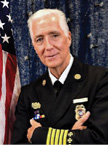Editor’s Opinion ❘ By BOBBY HALTON

I saw a shirt the other day that had this written on it: “It’s what I do … I fix stuff … And I know things.” I went online to see how much it cost. It was too expensive but still very cool. “I fix stuff and know things”—what a great line. If you think about it, everyone fixes stuff and everyone knows things—literally everyone. The stuff we know or the stuff we fix is different for all of us. I thought, what a perfect tagline for the fire service: We fix stuff and we know things! To be more accurate, firefighters fix other’s people’s stuff when their stuff goes wrong or breaks or catches fire. We know how to do stuff that puts out fires and saves lives.
- Humpday Hangout: Lithium-Ion Battery Fires
- Summer Shenanigans
- USFA: Responding to Lithium-Ion Battery Fires in Mobility Devices
Most of us can do simple fixes on simple stuff—change a flat tire, change out a blown fuse, or plunge out a stopped-up toilet. But, correctly rotating and balancing a tire—that is a skill, and the folks who do it professionally have insights and experience that come with time and focus. Wiring a circuit panel or rewiring a house or business—that takes an electrician, someone who has invested time and energy into learning all the aspects of the systems and procedures that go along with that work. It is the same with plumbers. Installing plumbing on a large scale—that is where training, knowledge, study, skill, and talent all come together.
We call the smart folks who have achieved mastery in their field “experts” or professionals, and that is high praise, earned recognition. The sign of a smart person is knowing when he has reached the limits of his expertise, training, and capabilities. Sometimes we call that humility, sometimes honesty; having those virtues and exercising them regularly make one wise. Wise firefighters look at issues and develop game plans—solutions as to how to best address those issues, failures, and accidents so that the harm, destruction, and danger go away and people and things are not in jeopardy from the issue any longer.
They say that wisdom comes with age, but I don’t think that is true for everyone—particularly not in my case. I know several old but really simple people; some are friends, and some are public figures. Being simple, we sometimes see things like a great mechanic or a talented plumber working and fail to appreciate how difficult or skilled that work is. Sometimes we create big problems for experts when we involve ourselves in DIY projects that we should not have. That is why most mechanic shops have a sign that says, “Labor $35 an hour if your car broke and you brought it right in; $45 an hour if you tried to fix it yourself first.”
Sometimes a well-intentioned industry or business develops something—again, albeit with the best of intentions—that creates big problems for others. They call that the law of unintended consequences.
The great American philosopher and humorist Will Rogers once said, “We’re all ignorant, just on different subjects.” I think the Cherokee kid nailed it. We’ve all worked with firefighters who were brilliant at certain aspects of the job and complete screw-ups in other aspects. The same goes with life in general: Some of us crush it in certain ways and just keep crashing right into it in others.
Lately, we are encountering some new challenges. Now, new challenges are the stuff that we thrive on. This one involves big players, society, car manufacturers, and governments. The problem is batteries—lithium-ion batteries. Now, on this page, we don’t do tactics, which is a good thing because, as best I can tell after spending time with the best firefighters, folks in the industry, and serious researchers, the tactics for extinguishing these batteries are still under development. At this point, we don’t have “experts” on extinguishing these batteries when they go into what is called “thermal runaway.” This condition can be for a wide variety of reasons: impact, heat exposure, and sometimes just from failure or poor construction.
Luckily, we have wise firefighters and wise researchers who can give us good advice as to what we can expect from these batteries when they get in trouble and how we can protect ourselves. The batteries are everywhere—cars, electric bikes, scooters, handheld devices, tools, toys, and the list goes on and on. A really smart firefighter who is all over this topic said, “If you can recharge it, it is probably lithium ion.” There are serious issues with these batteries when they are involved in a failure; people being killed, serious fires, highly dynamic heat release rates, and explosive events are hallmarks of these fires.
Old Ben Franklin is credited with saying, “Experience keeps a dear school; but fools will learn in no other, and scarce in that; for it is true, we may give advice, but we cannot give conduct.” The best advice I have on lithium-ion battery issues is to contact the Fire Department of New York (FDNY) Hazardous Materials Division, which has embraced being a clearinghouse for the fire service on this issue. When these batteries go into thermal runaway, the results can be and have been fatal.
The fires have been described by one of America’s preeminent firefighters, FDNY Deputy Chief Frank Leeb, as “our generation’s game changer.” They are that deadly.
We fix stuff and know things, that’s true, but on this issue, we only know enough to be cautious. Right now, there is no fix. We might not have the perfect answer, but we have options. The very best among us are raising the alarm: It is not if we will respond to a lithium-ion battery fire but when; let’s be prepared.


